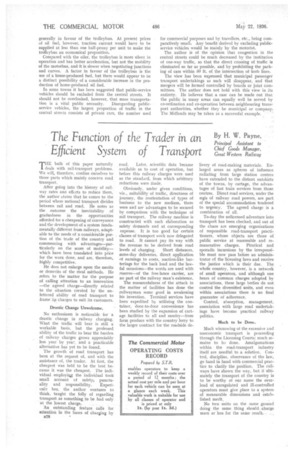The Function of the Trader in an
Page 38

If you've noticed an error in this article please click here to report it so we can fix it.
Efficient System of Transport
By H. W. Payne,
Principal Assistant fo Chief Goods Manager, Great Western Railway THE bulk of this paper naturally deals with rail-transport problems. We will, therefore, confine ourselves to those parts which mainly concern road transport.
After going into the history of railway rates and efferts to reduce them, the author states that he comes to the period where national transport divides between rail and road. He notes as the outcome the inevitability of gradualness in the opportunities afforded for a cheapening of conveyance and the development of a system tundamentally different from railways, adaptable to the needs of a considerable portion of the trade of the country and commencing with advantages—particularly on the score of mobility— which have been translated into price for the work done, and are, therefore, highly competitive, He does not enlarge upon the merits or demerits of the rival methods. He refers to the matter for the purpose of calling attention to an innovation —the agreed charge—directly related to the situation created by the unfettered ability of road transport to frame its charges to suit its customers.
Drastic Change Unwelcome.
No enthusiasm is noticeable for a drastic change in railway charging. What the traffic will bear is still a. workable basis, but the professed ability of the traffic to bear the burden of railway charges grows appreciably less year by year, and a practicable alternative has yet to be found.
The growth of road transport has been at the request of, and with the assistance of, the trader. At first, the cheapest was held to be the best because it was the cheapest. The individual employing the individual took small account cf safety, punctuality and responsibility. Experience has, the author ventures to think, taught the folly of regarding transport as something to be had only at the lowest charge. . An outstanding feature calls for attention in the bases of charging by B28 • road. Later, scientific data became available as to cost of operation, but before this railway charges were used as the standard, from which arbitrary reductions were made.
Obviously, under given conditions, viz., suitability of traffic, directness of journey, the reorientation of types of business to the new medium, there were and are advantages to be secured by comparison with the technique of rail transport, The railway machine is constructed with such elaboration as safety demands and at corresponding expense. It is too good for certain classes of transport work now delegated to road. It cannot pay its way with the revenue to be derived from road levels of charging. Short distances. same-day deliveries, direct application of earnings to costs, auction-like barterings for the back load and the lawful occasions—the words are used with reserve—of the free-lance carrier, are no part of the railway man's existence.
The resourcefulness of the attack in the matter of facilities has done the railwayman some good in awakening his invention. Terminal services have been expedited by utilizing the container, door-to-door convenience has been studied by the expansion of cartage facilities to all and sundry—from farm produce with the country lorry to the larger contract for the roadside de
livery of road-making materials. Enlarged areas as spheres of influence radiating from large station centres have extended to the distant outskirts of the towns, by cartage, the advantages of fast train services from those centres. Direct road services, under the regis of railway road powers, are part of the special accommodation tendered to urgency. The agreed charge is a combination of all.
To-day the unlicensed adventure into transport has been checked, and out of the chaos are emerging organizations of responsible road-transport practitioners, whose objects are those of public service at reasonable and remunerative charges. Piratical and sporadic incursions by the irresponsible must now pass before an administrator of the licensing laws and receive the justice which is their due. The whole country, however, is a network of small operators, and although one hears of common charges adopted by associations, these large bodies do not control the diversified units, and even within associations there is no final guarantee of adherence.
Control, absorption, management, association with large road undertakings have become practical railway politics.
Much to be Done.
Much winnowing ot the excessive and uneconomic transport is proceeding through the Licensing Courts; much remains to be. done. Amalgamations within the road-transport industry itself are needful to a solution. Cori trol, discipline, observance of the law, go hand in hand with commercial practice to clarify the position. The railways have shown the way, but if ultimately the transport of the country is to be worthy of our name the overload of unregulated and ill-controlled operators must give place to a system of measurable dimensions and established merit.
No two units on the same .ground doing the same thing should charm more or less for the same result. .




















































































